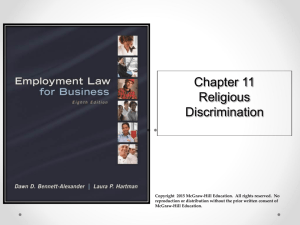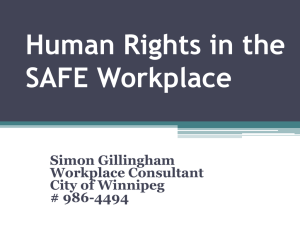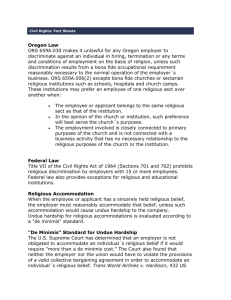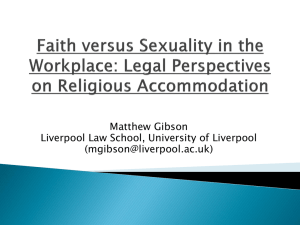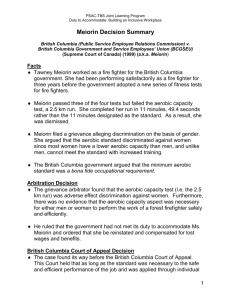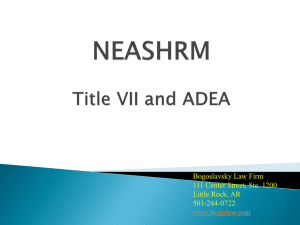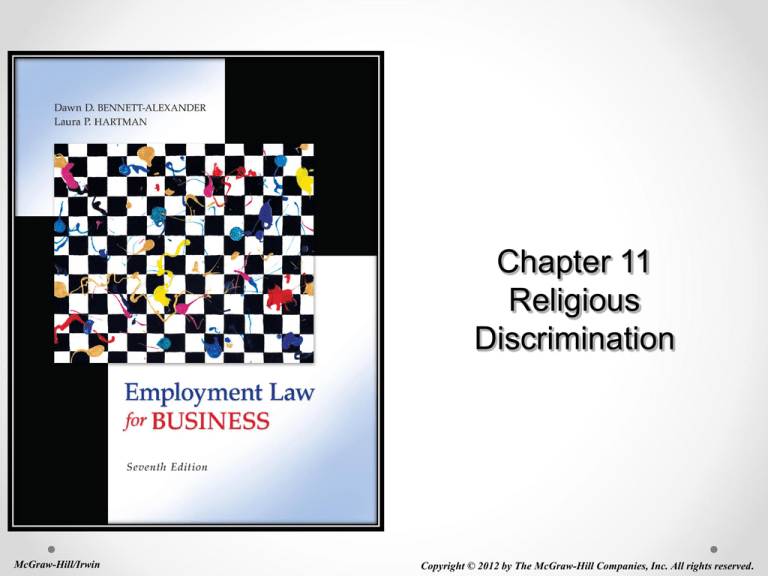
Chapter 11
Religious
Discrimination
McGraw-Hill/Irwin
Copyright © 2012 by The McGraw-Hill Companies, Inc. All rights reserved.
Learning Objectives
Discuss the background of religious
discrimination and give some contemporary
issues
Give Title VII’s definition of religion for
discrimination purposes
Explain religious conflicts under Title VII and
give examples
Define religious accommodation and guidelines
to its usage
11-2
Learning Objectives
Define undue hardship as it allows an employer
defense to religious discrimination claims
Describe religious harassment and give
examples
Identify the ways in which unions and religious
conflicts occur
List some ways in which management can avoid
religious discrimination conflicts
11-3
This is Not Your Forefather’s Religious
Discrimination
Henry VIII’s break from the Catholic Church and
it’s aftermath
The U.S. Constitution
Freedom of religion
Title VII prohibits discrimination in employment
based on religion
11-4
This is Not Your Forefather’s Religious
Discrimination
Small number of EEOC claims
On the rise since 1993
Spike after September 11, 2001
Increase in litigation in the 1980s and early
1990s
Fundamentalist Christianity and televangelism
Sharing their faith
11-5
This is Not Your Forefather’s Religious
Discrimination
Current issues have extended to those
surrounding Middle Eastern religions
Practices and dictates conflicting with work
environment
Title VII is the only legislation specifically
prohibiting religious discrimination in
employment
11-6
This is Not Your Forefather’s Religious
Discrimination
Federal and constitutional guarantees for
federal, state, and local government employees
Due process
Equal protection
Freedom of religion
11-7
This is Not Your Forefather’s Religious
Discrimination
Duty to reasonably accommodate: The
employer’s Title VII duty to try to find a way to
avoid conflict between workplace policies and an
employee’s religious practices or beliefs
Undue hardship: Burden imposed on employer,
by accommodating employee’s religious conflict,
that would be too onerous for employer to bear
11-8
This is Not Your Forefather’s Religious
Discrimination
Religion is recognized as a basis for BFOQ
Specific facts play an important role in making the
determination
Current basis for lawsuits – Conflict of religious
practice and workplace policies
11-9
Major Religions of the World—Ranked by
Number of Adherents
11-10
Major Religions in the U.S.
Top Organized Religions
Christianity
76.5%
Judaism
1.3
Islam
0.5
Buddhism
0.5
Hinduism
0.4
Unitarian Universalist
0.3
Wiccan/Pagan/Druid
0.1
11-11
What is Religion?
Accommodation considerations when the
religion is unknown
Is the belief closely held?
Does it take the place of religion in the employee’s
life?
Atheism also considered a religion under Title VII
11-12
What is Religion?
Employer duty to accommodate
Attaches to the conflict itself, not to when the conflict
arises
Applies to religious practices, not religious belief
11-13
Religious Conflicts
An employee engaging in some religious
practice that is not perceived to be compatible
with the workplace
Sometimes the conflict is with the employer’s
religion
11-14
Religious Conflicts
Requirements for a prima facie case
Employee has a sincere religious belief that conflicts
with an employment requirement
Employee informed the employer of the conflict
Employee was discharged or disciplined for failing to
comply with the conflicting employment requirement
Once prima facie case is established the burden
shifts to the employer to prove reasonable
accommodation was offered
11-15
Religious Conflicts
Employer considerations
Make sure the basis for conflict is a religious one
Attempt a good-faith accommodation of the religious
conflict
The right to be free of religious discrimination is
not absolute
11-16
Employer’s Duty to Reasonably
Accommodate
The duty to accommodate depends on the
circumstances
Employer relieved of liability if
Employee was reasonably accommodated
An attempt was made to reasonably accommodate
the employee
11-17
Employer’s Duty to Cooperate in
Accommodation
Under Title VII the employer is not required to
resolve conflict in the way the employee wants
Accommodation need not be the most
reasonable
11-18
Employer’s Duty to Cooperate in
Accommodation
Factors determining reasonable accommodation
Whether the employer made an attempt at
accommodation
The size of the employer’s workforce
The type of job in which the conflict is present
The employer’s checking with other employees to see
if anyone was willing to assist in the accommodation
The cost of accommodation
The administrative aspects of accommodation
11-19
What Constitutes Undue Hardship?
Factors determining undue hardship:
The nature of the employer’s workplace
The type of job needing accommodation
The cost of the accommodation
The willingness of other employees to assist in the
accommodation
11-20
What Constitutes Undue Hardship?
Factors determining undue hardship (contd..)
The possibility of transfer of the employee and its
effects
What is done by similarly situated employees
The number of employees available for
accommodation
The burden of accommodation on the union (if any)
11-21
What Constitutes Undue Hardship?
Courts find undue hardship if an employer has to
violate the seniority provision of a valid collective
bargaining agreement
pay out more than a “de minimis” cost to replace a
worker who has religious conflicts
force other employees to trade places with the
employee who has a religious conflict
11-22
Religion as a BFOQ
Title VII
Permits religion to be a bona fide occupational
qualification
specifically permits educational institutions to employ
those of a particular religion if they are owned in
whole or in substantial part by a particular religion
11-23
Religious Harassment
Prohibited under Title VII
Religious Freedom Restoration Act
religious practices must be accommodated unless a
compelling governmental interest can be
demonstrated and advanced in the least restrictive
manner
U.S. Supreme Court overturned RFRA in 1997
11-24
Religious Harassment
Under the guidelines set forth by President
Clinton, federal employees
Should be permitted to engage in private religious
expression in personal work areas
Should be permitted to engage in religious expression
with fellow employees
Are permitted to engage in religious expression
directed at fellow employees
11-25
Religious Harassment
To avoid liability employers should
Protect employees from those religious employees
who attempt to proselytize others who do not wish to
be approached about religious matters
Protect employees with permissible religious
practices who are given a hard time by those who
believe differently
Make sure that employees are given comparable
opportunities to use workplace time and resources for
religious practices
11-26
Union Activity and Religious Discrimination
Unions are also under a duty to reasonably
accommodate religious conflicts
Frequent conflicts
Union membership
Payment of union dues
Picketing and striking
11-27
Union Activity and Religious Discrimination
It violates Title VII for an employer to discharge
an employee for refusal to join the union
because of his or her religious beliefs
The Establishment Clause
11-28
Management Tips
Take all employee notices of religious conflicts
seriously
After an employee puts the employer on notice
of a religious conflict, immediately try to find
ways to avoid the conflict
Ask the employee with the conflict for
suggestions on avoiding the conflict
Ask, but don’t require, other employees to assist
11-29
Management Tips
Keep workplace religious comments and
criticisms to a minimum
Make sure all employees understand that they
are not to discriminate against employees on the
basis of religion
Do not challenge that employee’s religious
beliefs during a conflict
Make sure undue hardship actually exists if it is
claimed
11-30

